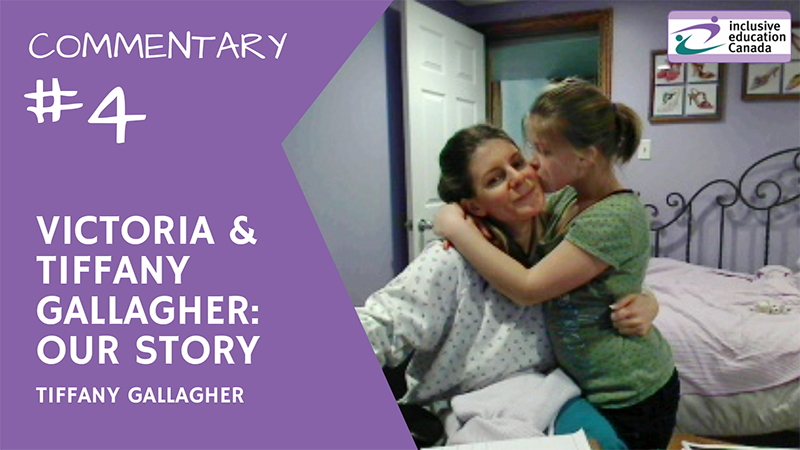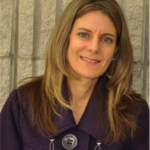 National Inclusive Education Month Commentary #4
National Inclusive Education Month Commentary #4
By Victoria and Tiffany Gallagher
During this month celebrating inclusion, I thought that it would be illustrative to hear from a young adult who has grappled with inclusive practices and accommodations all of her life. Victoria, my daughter, reflects on her experiences as an elementary and secondary student. She has three impactful messages for students, as well as their parents and teachers.
Students, to those of you who experience living with a learning disability, I want you to know firstly that you are not alone. Stop beating yourself up and feeling ashamed because I know for a fact that on paper you might not get the best grades, but you are for sure the one that works the hardest and puts the most effort into your work.
Growing up I noticed that I was different then a lot of kids. I went to many different doctors’ offices, where I felt like a science experiment and got pulled out of classes to work in a quiet room and I never understood why I couldn’t be with my friends in the classroom like a normal kid. Well, that’s because for the longest time I did know I had a learning disability, no one told me until I was in about 4th grade. My parents finally told me why I always felt differently than all the kids. They said, “Victoria you have a learning disability, but that doesn’t mean you’re stupid, you just learn differently.” The next year I was put on medication for my ADHD. Again, I didn’t know why I had to take the pill before 9 a.m. but I just did, From then on out I finally said, “ENOUGH, I am putting my foot down, I am in control of life. If I don’t want to take advantage of my accommodations to feel like a normal person then I won’t.” I got to the age where I can make decisions on my own. Sure, my teachers, parents, and doctors were angry, but I think at times you need to teach them a lesson, by saying this is my body, my education, my life, and I need to make some decisions. That’s why it’s important to have a good support team, because they respected me. Sure, they didn’t always agree with some of my decisions, but it gave me the opportunity to grow, learn, and most importantly, never give up. To those students who are still in grade school, I want you to know that you are in control of your body, education, and life. You need to do what’s best for you and if they can’t respect that then prove them wrong. Also don’t be afraid to ask questions, because you have the right to know.
Parents, there is a saying, “put yourself in their shoes.” If you wrap a bandana around your eyes, it would mimic being blind. But you can’t do the same thing to understand your child with a learning disability. Parents try to do their best for their children, but as someone who has a learning disability, I believe that you need to educate your child after being diagnosed, explain everything to them, why they go to see different doctors, why they take medication, why they get extra time to do school work. Your child has the right to know. At a certain age, sometimes you have to let your child make his or her own decisions, whether that means not using accommodations, or stop taking medication on weekends etc. You may not agree with the decisions your child makes, but it will help your child learn. If you keep on sheltering your child then he or she will never be able grow to his or her full potential. Also listen to your child, let them speak their mind and do not be afraid because at the end of the day, your child knows what’s best for him or her. If your child forgets to take a pill because of being embarrassed at a sleepover, listen because it affects them socially.
Teachers, remember students with learning disabilities are just like any other kid. The worst thing you can do to a child that has a learning disability is center them out and force them to use their accommodations. Listen to the child, if they feel embarrassed then let them act as if they don’t have a learning disability. Teachers affect students. I’m 20-years-old and I still have flash backs to when I was a child in a classroom and my teacher was babying me and making me feel stupid and not like a normal kid. The worst thing that a teacher can do is make a comparison to an older sibling with comments like, “Your sister was smart,” “When I taught your sister, she could read at this level,” “Have you taken your medication today?” “I can tell when Victoria doesn’t take her medication.”
How do think that makes a student feel? Not just someone with a learning disability but just a student in general? Going to school should not feel like going to jail, but a place where the child feels accepted, safe, and confident. When you have parent-teacher interviews, it’s important to invite the student to participate. What never made sense to me was a teacher would ask to speak to my parents about my progress without me. Teachers tell students to not talk about other people behind their backs, how hypercritical of you? The student has a right to join if he or she wants to. How are they supposed to improve if they don’t know? This can start as young as kindergarten. Like I said to the parents, a child with a learning disability gets to an age where he or she wants to make their own decisions and you need to respect that you may not agree with the decisions but let them learn from their consequences. You can assist them when they ask for it, not when you think it’s best, because you don’t always know when it’s best. Sometimes you have to take your teacher hat off and just support a student by reminding him or her that he or she is a smart, hardworking, normal kid. Be the teacher that makes a difference in a child’s life and go beyond the classroom doors.
Post Script: Victoria is a successful, second year, post-secondary student in a college program that is demanding and fast-paced. She has intentions to pursue a bachelor’s degree and career in business. As her mother, a teacher and an educational researcher, I continue to be amazed by how much I have to learn from her about what inclusion means.
 Tiffany Gallagher is an Associate Professor (PhD), Director, Brock Learning Lab at Brock University in St. Catharines, Ontario and a member of the Network of Associates of Inclusive Education Canada.
Tiffany Gallagher is an Associate Professor (PhD), Director, Brock Learning Lab at Brock University in St. Catharines, Ontario and a member of the Network of Associates of Inclusive Education Canada.
